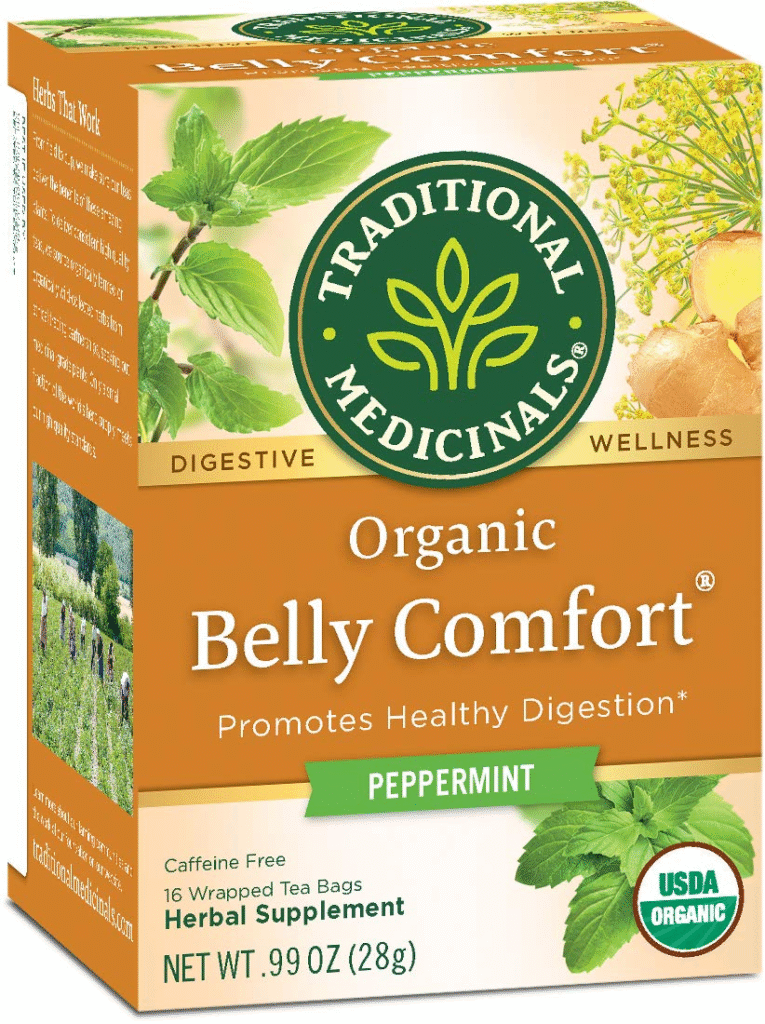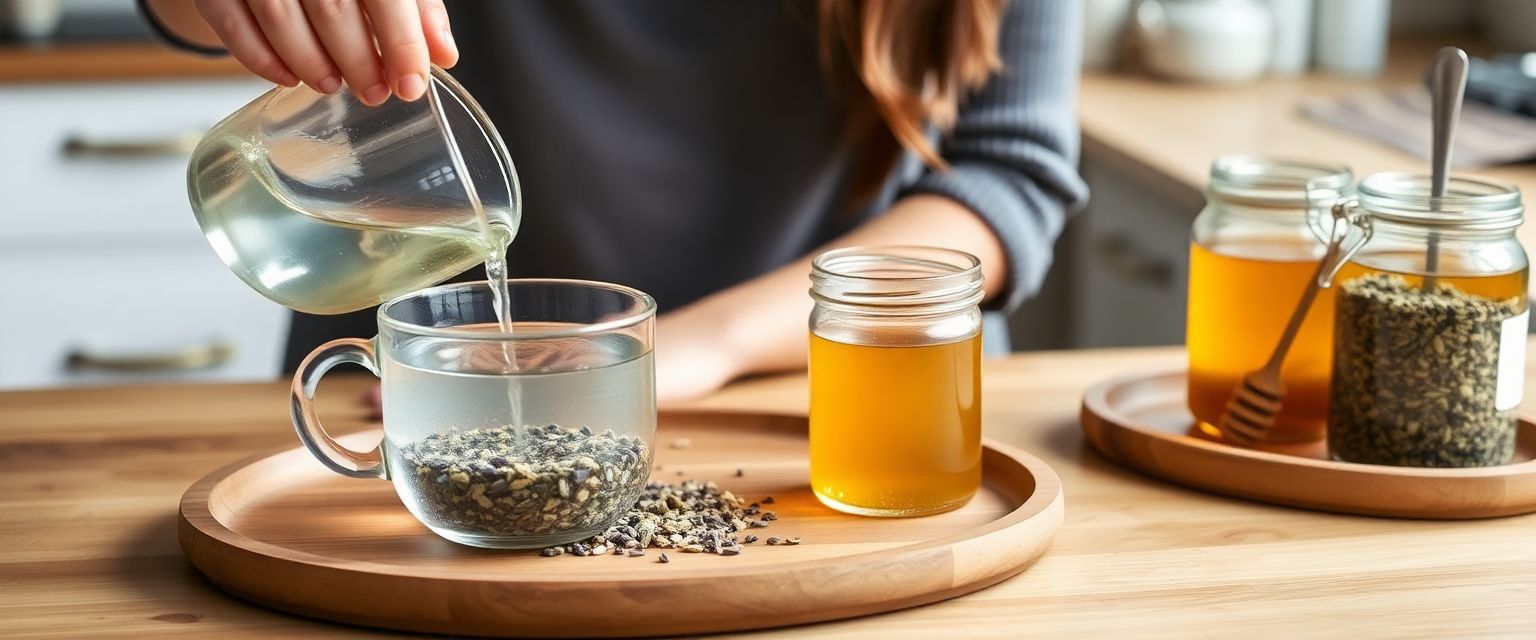In our fast-paced world, finding moments of tranquility can be challenging. The key to unlocking a sense of calm and relaxation lies right in your kitchen.
As someone who has spent years exploring the soothing properties of various herbs and perfecting the art of tea blending, I’m excited to share my top 10 calming tea recipes with you.
These blends are carefully crafted to help you unwind, de-stress, and find your center.
Creating your own calming teas offers numerous benefits. You have complete control over the ingredients, allowing you to tailor your tea to your specific needs and preferences.
You can avoid additives or artificial ingredients often found in store-bought teas.
Plus, the act of preparing your own tea becomes a mindful, relaxing ritual in itself.
So, let’s put the kettle on, grab your favorite mug, and explore these 10 soothing DIY calming tea recipes that will help you unwind and relax.
1. Classic Chamomile Calm
Let’s start with a timeless favorite: chamomile tea. Known for its gentle, apple-like flavor and calming effects, chamomile forms the perfect foundation for a relaxing blend.
Ingredients:
- 2 teaspoons dried chamomile flowers
- 1 teaspoon dried lemon balm
- 1/2 teaspoon dried lavender buds
To prepare this soothing blend, mix the dried herbs and store them in an airtight container. When you’re ready for a cup, steep a tablespoon of the mixture in hot water (not boiling) for 5-7 minutes.
The resulting tea is light, floral, and incredibly soothing.
Chamomile has been used for centuries to promote better sleep and reduce anxiety. The addition of lemon balm adds a subtle citrusy note and enhances the calming effect.
Lavender, with its lovely aroma, further aids relaxation and can help ease tension headaches.
For an extra touch of sweetness, try adding a small amount of honey to your brewed tea. The natural sugars can help boost the absorption of the herbs’ beneficial compounds.
You can also try this product. TAZO Calm Chamomile Herbal Tea

2. Lavender Lullaby Blend
When sleep seems elusive, this blend can be your ticket to dreamland. Lavender is renowned for its ability to promote relaxation and improve sleep quality.
Ingredients:
- 1 teaspoon dried lavender buds
- 1 teaspoon dried chamomile flowers
- 1/2 teaspoon dried passionflower
- A pinch of dried vanilla bean (optional)
To prepare, mix the herbs and store in an airtight container. Steep a tablespoon of the blend for 7-10 minutes in hot water.
The lavender and chamomile create a beautifully balanced base, while passionflower adds depth and enhances the sleep-promoting properties.
The optional vanilla bean adds a subtle sweetness and comforting aroma that can make this tea feel like a true bedtime treat.
Lavender has been shown to increase slow-wave sleep, the very deep sleep in which the brain and body revitalize. Passionflower has been used traditionally to treat anxiety and insomnia.
Together, these herbs create a powerful sleep-inducing combination.
The effectiveness of this blend can be enhanced by creating a bedtime ritual around it. Try drinking this tea about an hour before bed, in a quiet, dimly lit room.
This can signal to your body that it’s time to wind down and prepare for sleep.
You can also try this Product: HERBOGANIC Lavender Herbal Tea

3. Stress-Busting Tulsi Blend
In times of high stress, this blend can be your go-to remedy. Tulsi, also known as Holy Basil, is an adaptogenic herb that helps the body manage stress.
This blend combines Tulsi with other stress-relieving herbs for a powerful calming effect.
Ingredients:
- 1 teaspoon dried Tulsi leaves
- 1 teaspoon dried lemon balm
- 1/2 teaspoon dried ashwagandha root
- 1/4 teaspoon dried ginger root
Mix the herbs and store in an airtight container. To prepare, steep a tablespoon of the blend for 10 minutes to allow the roots to fully infuse.
Tulsi and lemon balm work together to soothe frazzled nerves, while ashwagandha is known for its stress-reducing properties.
The touch of ginger adds a warm, spicy note and aids digestion, which can be helpful when stress affects your stomach.
Tulsi has been used in Ayurvedic medicine for thousands of years and is revered for its ability to promote physical and emotional well-being. Ashwagandha, another adaptogenic herb, has been shown to significantly reduce cortisol levels, helping to mitigate the effects of stress on the body.
This blend can be particularly effective when consumed regularly. Try incorporating it into your daily routine, perhaps as a mid-afternoon pick-me-up or as part of your evening wind-down ritual.
You can also try this product: ORGANIC INDIA Tulsi Turmeric Ginger Herbal Tea

4. Mindfulness Mint Medley
When you need to center yourself and find focus, this refreshing blend is perfect. Peppermint is invigorating yet calming, making it ideal for mindful moments.
Ingredients:
- 1 teaspoon dried peppermint leaves
- 1 teaspoon dried lemon balm
- 1/2 teaspoon dried rosemary
- A pinch of dried stevia leaf (optional, for sweetness)
Mix the herbs and store in an airtight container. Steep a tablespoon of the blend for 5-7 minutes.
The cool, crisp flavor of peppermint helps clear the mind, while lemon balm adds a calming element.
Rosemary is known to improve cognitive function and memory, making this blend perfect for a mid-day reset.
Peppermint has been shown to enhance alertness and cognitive performance, while also reducing stress and anxiety. The combination with rosemary, which has been linked to improved concentration and memory, makes this tea an excellent choice for times when you need to focus and stay calm.
This blend can be particularly effective when paired with mindfulness exercises. Try sipping this tea slowly, focusing on the sensations of taste and smell.
This can serve as a simple mindfulness practice, helping to ground you in the present moment.
You can also try this product: Bigelow Tea Mint Medley Herbal Tea

5. Bedtime Bliss
When you need serious sleep support, this powerful blend is designed to prepare your body and mind for a restful night’s sleep. It combines some of the most effective sleep-promoting herbs.
Ingredients:
- 1 teaspoon dried valerian root
- 1 teaspoon dried passionflower
- 1/2 teaspoon dried hops flowers
- 1/4 teaspoon dried skullcap
Mix the herbs and store in an airtight container. Steep this blend for 10-15 minutes to fully extract the benefits of the roots and flowers.
Valerian is a potent sleep aid, while passionflower enhances overall sleep quality.
Hops, known for its use in beer, is actually a powerful sedative herb. Skullcap rounds out the blend with its ability to reduce anxiety and promote relaxation.
Valerian root has been shown in many studies to improve sleep quality and reduce the time it takes to fall asleep. Hops contain a compound called methylbutenol, which has sedative effects.
Together, these herbs create a powerful sleep-inducing combination.
Due to the potent nature of these herbs, it’s best to drink this tea about an hour before bedtime. Also, be aware that valerian can have a strong odor that some people find unpleasant.
If this bothers you, try adjusting the ratio of herbs to find a balance you enjoy.
You can also try this product: Yogi Bedtime Tea

6. Anxiety-Easing Elixir
When anxiety strikes, turn to this blend of nervine herbs known for their ability to calm the nervous system and ease worried minds.
Ingredients:
- 1 teaspoon dried lemon balm
- 1 teaspoon dried oat straw
- 1/2 teaspoon dried skullcap
- 1/4 teaspoon dried lavender buds
Mix the herbs and store in an airtight container. Steep for 7-10 minutes.
Lemon balm is a powerful anxiety-reducer, while oat straw nourishes the nervous system.
Skullcap is known for its ability to reduce racing thoughts, and lavender adds its signature calming touch.
Lemon balm has been shown to boost GABA levels in the brain, which helps reduce anxiety. Oat straw, while less well-known, has been used traditionally to calm the nervous system and reduce anxiety.
Skullcap contains compounds that bind to receptors in the brain that help regulate mood.
This blend can be particularly helpful during stressful times. Consider keeping a batch pre-mixed and ready to go, so you can easily brew a cup when you feel anxiety creeping in.
You can also try this product: Traditional Medicinals Tea, Organic Stress Ease

7. Digestion-Calming Comfort
Sometimes, stress and anxiety can manifest as digestive discomfort. This blend aims to soothe both the mind and the stomach.
Ingredients:
- 1 teaspoon dried peppermint leaves
- 1 teaspoon dried chamomile flowers
- 1/2 teaspoon dried fennel seeds
- 1/4 teaspoon dried ginger root
Mix the herbs and store in an airtight container. Steep for 7-10 minutes.
Peppermint and ginger are both excellent for soothing upset stomachs, while chamomile calms the mind and body.
Fennel adds a sweet, licorice-like flavor and further aids digestion.
Peppermint has been shown to relax the muscles of the gastrointestinal tract, which can help relieve symptoms of irritable bowel syndrome and other digestive issues. Ginger is well-known for its ability to ease nausea and reduce inflammation in the digestive system.
This blend can be particularly helpful after meals or during times of digestive stress. Consider brewing a larger batch and keeping it in the refrigerator for easy access when needed.
You can also try this product: Traditional Medicinals Organic Belly Comfort

People Also Asked
What herbs are good for anxiety?
Several herbs have been traditionally used to help manage anxiety. Some of the most popular include chamomile, lavender, lemon balm, passionflower, and valerian root.
These herbs are often found in calming tea blends and can be consumed individually as well.
Can drinking tea really help with stress?
Yes, certain teas can help reduce stress levels. Many herbal teas contain compounds that have been shown to have calming effects on the body and mind.
For example, chamomile tea has been found to reduce symptoms of generalized anxiety disorder, while green tea contains L-theanine, an amino acid that can promote relaxation.
How often should I drink calming tea?
The frequency of drinking calming tea can vary depending on person needs and the specific herbs used. Generally, it’s safe to drink 1-3 cups of most herbal teas daily. However, some herbs may have side effects or interactions with medications, so it’s always best to talk to a healthcare provider, especially if you plan to consume them regularly.
Is it safe to drink calming tea every night?
For most people, drinking a cup of calming tea every night is safe and can be a beneficial part of a bedtime routine. However, some herbs (like valerian root) may cause drowsiness and are best reserved for evening use.
Always pay attention to how your body responds and talk to a healthcare provider if you have any concerns.
Can I mix different calming herbs together?
Yes, mixing different calming herbs can often enhance their overall effect. Many of the recipes provided in this article mix many herbs for a synergistic calming effect.
However, it’s important to be aware of potential interactions between herbs and to start with small amounts when trying new combinations.
How long does it take for calming tea to work?
The time it takes for calming tea to take effect can vary depending on the person and the specific herbs used. Some people may feel the effects within 15-30 minutes of drinking the tea, while for others it may take longer. Consistent use over time often yields the best results.
Are there any side effects of drinking calming teas?
While herbal teas are generally safe, some people may experience side effects. These can include allergic reactions, digestive upset, or interactions with medications.
Some herbs, like St. John’s Wort, can interact with many common medications.
It’s always best to start with small amounts and to talk to a healthcare provider if you have any concerns.
Can I drink calming tea if I’m pregnant or breastfeeding?
Many herbs are not recommended during pregnancy or while breastfeeding due to potential effects on the baby. Some herbs that are generally considered safe include ginger, peppermint, and red raspberry leaf, but it’s crucial to talk to a healthcare provider before consuming any herbal teas during pregnancy or while breastfeeding.
How should I store my herbal tea blends?
To maintain the freshness and potency of your herbal tea blends, store them in airtight containers away from light, heat, and moisture. A cool, dark cupboard is ideal.
Properly stored, most dried herbs can maintain their quality for 6-12 months.
Can calming teas replace medication for anxiety or sleep disorders?
While calming teas can be a helpful addition to a stress management or sleep hygiene routine, they should not be considered a replacement for prescribed medications without consulting a healthcare provider. If you’re dealing with chronic anxiety or sleep issues, it’s important to work with a healthcare professional to develop a comprehensive treatment plan.
Key Takeaways
- DIY calming tea blends offer a natural way to promote relaxation and manage stress.
- Different herbs have various calming properties, allowing you to create blends tailored to your specific needs.
- Consistent use of calming teas, especially when paired with mindful rituals, can enhance their effectiveness.
- While generally safe, it’s important to be aware of potential side effects or interactions, especially if you’re pregnant, breastfeeding, or taking medications.
- Proper storage of your herbal blends helps maintain their freshness and potency.
Disclaimer
The information contained in this post is for general information purposes only. The information is provided by Soothing DIY Calming Tea Recipes to Unwind and Relax and while we endeavor to keep the information up to date and correct, we make no representations or warranties of any kind, express or implied, about the completeness, accuracy, reliability, suitability or availability with respect to the website or the information, products, services, or related graphics contained on the post for any purpose.

